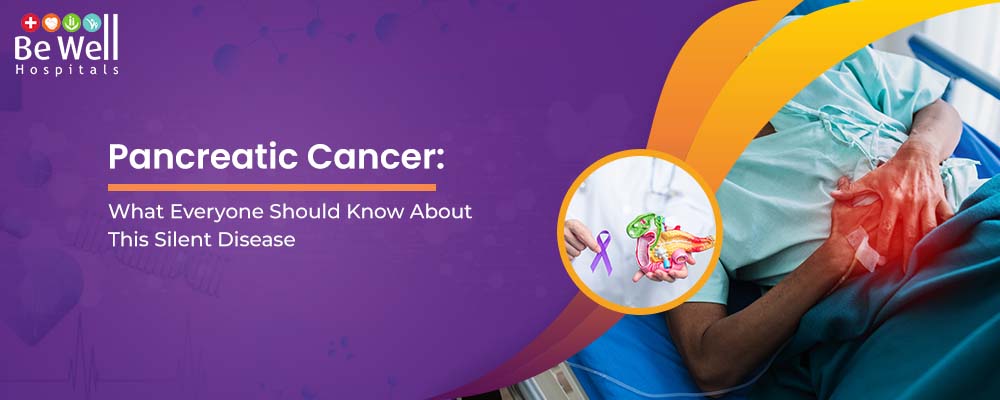
Introduction
Pancreatic cancer, often referred to as a "silent disease," is a serious condition that develops in the pancreas—a vital organ responsible for aiding digestion and regulating blood sugar levels. Its early stages typically present no noticeable symptoms, making awareness and timely detection crucial for improving outcomes. Understanding the nature of pancreatic cancer, its role in the body, and the factors that contribute to its development is essential in combating this challenging disease. In this blog, we’ll delve into the key aspects of pancreatic cancer, including its symptoms, risk factors, diagnosis, treatment options, and preventive measures, to raise awareness and promote informed healthcare decisions.
Types and Symptoms of Pancreatic Cancer
Pancreatic cancer is categorized into two primary types, each differing in origin and behavior.
Exocrine Tumours: The most common type of pancreatic cancer, originating in the ducts that carry digestive enzymes.Endocrine Tumours: Rare but significant, these arise from the hormone-producing cells of the pancreas.Recognizing the symptoms of pancreatic cancer is essential for early detection.
Early Symptoms: Abdominal or back pain, loss of appetite, and unexplained weight loss.Advanced Symptoms: Jaundice (yellowing of the skin and eyes), dark urine, light-colored stools, and persistent fatigue.Since these symptoms can overlap with less serious conditions, paying close attention to persistent or worsening signs is crucial. Early diagnosis can significantly improve outcomes, making awareness of these symptoms vital.
Risk Factors for Pancreatic Cancer
Understanding the risk factors for pancreatic cancer is crucial for early detection and prevention of this serious disease.
Lifestyle Factors: Smoking, obesity, and lack of physical activity are significant risk factors for pancreatic cancer. A sedentary lifestyle, excess body weight, and tobacco use greatly increase susceptibility to the disease.Health Conditions: Chronic pancreatitis, diabetes (type 1 or 2), and a family history of pancreatic cancer increase the risk of developing the disease. Persistent inflammation, high blood sugar, and genetic factors contribute significantly.Age and Gender: Pancreatic cancer is more common in individuals over 60, with the majority of cases occurring in older adults. Additionally, men have a slightly higher incidence rate compared to women.Genetic Predisposition: Certain hereditary syndromes and genetic mutations, such as BRCA2, are linked to an increased risk of pancreatic cancer.Awareness of these risk factors can empower individuals to make lifestyle changes and seek timely medical advice, potentially reducing the risk of pancreatic cancer.
How Pancreatic Cancer is Diagnosed
Diagnosing pancreatic cancer involves a combination of medical imaging, blood tests, and biopsies to detect the presence of cancer and determine its stage.
Diagnostic Techniques: Imaging tests like CT scans, MRI, and PET scans are crucial in diagnosing pancreatic cancer. CT scans identify tumors, MRI provides detailed images, and PET scans detect cancerous cells by highlighting abnormal glucose metabolism.Blood Tests: Tumor markers like CA 19-9, elevated in some cases of pancreatic cancer, can indicate the presence of the disease, but they are not definitive and must be confirmed through other diagnostic tests.Biopsy for Confirmation: A biopsy involves removing tissue from the pancreas to examine for cancerous cells, offering the most accurate diagnosis.Challenges in Early Detection: Pancreatic cancer is often diagnosed in advanced stages due to its subtle symptoms, making early detection difficult. Imaging tests and tumor markers may not detect the cancer until it has spread.Early diagnosis through these methods is key to effective treatment, offering better outcomes and improved chances for patients facing pancreatic cancer.
Treatment Options for Pancreatic Cancer
Treatment options for pancreatic cancer vary depending on the stage and location of the tumor
Surgery: The Whipple procedure is the most common surgery for pancreatic cancer, removing parts of the pancreas, small intestine, gallbladder, and sometimes the stomach. Other surgeries may be performed if the tumor is localized but not suitable for the Whipple procedure.Chemotherapy and Radiation Therapy: Chemotherapy is used to destroy remaining cancer cells after surgery or shrink tumors when surgery isn't possible. Radiation therapy, often combined with chemotherapy, helps shrink tumors, reduce pain, and target inoperable cancer cells.Targeted Therapy and Immunotherapy: Targeted therapy uses drugs to target cancer’s genetic mutations and molecular pathways, minimizing damage to normal cells. Immunotherapy boosts the immune system to fight cancer, offering promise for advanced cases with specific genetic markers.Multidisciplinary Care: A comprehensive treatment plan that involves a team of specialists, including oncologists, surgeons, radiologists, nutritionists, and palliative care providers, is crucial for managing pancreatic cancer effectively. This collaborative approach ensures the best possible outcomes, providing patients with personalized and holistic care.Choosing the right treatment plan, tailored to individual needs, is crucial for improving outcomes and managing pancreatic cancer effectively.
Conclusion
Understanding the symptoms, risk factors, and importance of early detection is crucial when it comes to pancreatic cancer. Recognizing warning signs such as unexplained weight loss, abdominal pain, jaundice, and fatigue can make all the difference in detecting the disease in its early stages. Additionally, being aware of risk factors like smoking, obesity, family history, and certain medical conditions can help individuals take preventive actions to reduce their risk. It's essential to prioritize your health and consult a healthcare professional if you experience persistent symptoms. Early detection and timely intervention can significantly improve outcomes.
At Be Well Hospitals, we are committed to providing expert care for cancer patients through our comprehensive oncology services. Visit our Oncology department at Be Well Hospitals or call 9698 300 300 to book an appointment and take the next step towards better health.

